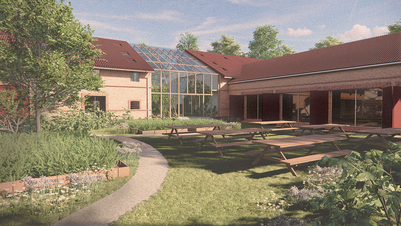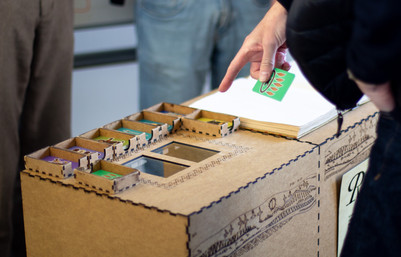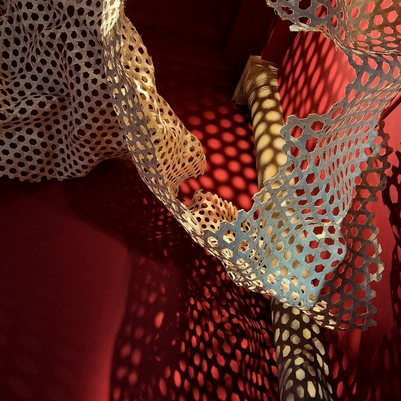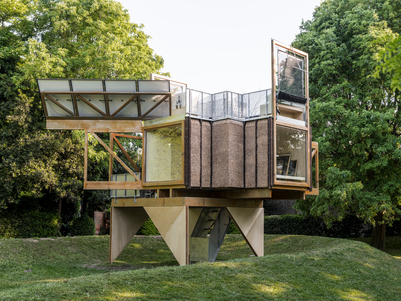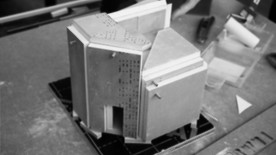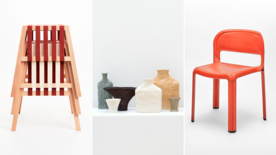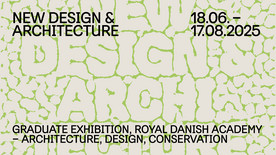
Kursusprogram 2024
Ph.d.-skolen udbyder kurser inden arkitektur, design og konservering. Derudover udbyder ph.d.-skolen generiske kurser på ph.d.-niveau.
Alle ph.d.-studerende indskrevet ved en ph.d.-gradsgivende institution i Danmark kan melde sig til kurser ved ph.d.- skolen uden beregning. Der kan dog være begrænsninger på deltagerantallet på de enkelte kurser.
Ph.d.-studerende indskrevet ved en udenlandsk instutiton, må påregne et deltagergebyr på 1200 kr. pr. ECTS.
Introduction to Academic Practices
Introduction to Academic Practices
Titel // Titel
Introduction to Academic Practices
Ansvarlig(e) // Coodinator(s)
Dag Petersson
Kursusbeskrivelse // Course description
Through this course, students obtain insights in the fundamentals of academic research practices. Particular focus is on crafting a proper academic object, formulating a good problem statement, structuring one’s data collection, and getting a first grasp on method, theory and analysis. This introduction is primarily for Ph.D.-students from the art, architecture, and design schools, aiming particularly at those who are in the early phases of their projects Teaching is based on the participants’ individual project descriptions. No previous experience with academic production is expected. The goal is to critically identify each project’s inherent academic requirements and preferred strategy, and to help students meet the established academic criteria and standards from early on.
Participants must email their full Ph.D. project description and project plan to dag.petersson@kglakademi.dk prior to the application deadline.
Sprog // Language
English
Datoer // Dates
Week 3: 15-19 January 2024
Min. and max participants
Min 5-max 12
ECTS // ECTS
4 ECTS
Tilmeldingsfrist // Application deadline
Application deadline has been extended to 3. January 2024 via https://katalog.kglakademi.dk/phdtilmeld.php
Artificial Intelligence in Architectural Research
Artificial Intelligence in Architectural Research
Ansvarlig(e) // Coodinator(s)
Anders Hermund
Øvrige undervisere // Other lecturers
Henrik Oxvig og Jacob Bang
Kursusbeskrivelse // Course description
The course introduces artificial intelligence in research as a potential player in the creative process. We look at A.I. text generation tools and Machine Learning where A.I. text-to-image generation is used as a possible inspiration to get started with studies of moods, spatiality and to support a reflection on the architectural vision and narratives in architecture projects. A research project in Tanzania using remote sensing and machine learning artificial intelligence will also be introduced as a case study.
We will combine philosophical, artistic, and scientific approaches in order to discuss the potentials and the potential dangers by A.I. as an instrument or agent in our daily work with art and research, and the big questions of modern society. During the course we will have reflections and discussions based on presentations from the lecturers and a reader comprising texts from Plato, Heidegger, Deleuze to modern tech philosophers like Kevin Kelly and Jaron Lanier.
We will also hands-on introduce and use A.I. tools during the course to produce material for discussion in relation to research, art, and scientific work in the individual PhD projects.
Sprog // Language
English (or Danish if only Danish speaking students)
Datoer // Dates
Week 9 (26th February - 3rd March) 2024. Course will be one week, with presentations Monday, Wednesday, and Friday.
Lokalitet // Venue
Royal Danish Academy, Copenhagen
Min. og max deltagerantal // Min. and max participants
5-15
ECTS // ECTS
3
Tilmeldingsfrist // Application deadline
3rd January 2024 via https://katalog.kglakademi.dk/phdtilmeld.php
Material Studies in Architecture and Design
Material Studies in Architecture and Design
Lecturer(s):
Isak Worre Foged
Phil Ayres
Course Description:
Materials are an embedded part of design thinking, design experiments and design making, both in academia and industry. They also form a central leverage point in the transition to a sustainable society, and a core aspect of how we develop experiential phenomena for our design targets.
We engage with materials constantly, but how do we study materials, material processes and material representations in design led research?
This course focuses on illustrating and debating research strategies and methods for material studies in architecture and design. This implicates the forming of a dual research platform of both quantitative and qualitative investigations that enable new insights across the design scales.
The course is structured around 2 activities: An initiating 2-Day seminar, where invited speakers and participating PhD students will present and discuss research approaches. This is followed by a 2-Day workshop on how to advance the methodological approaches of the student specific projects.
Course dates:
10-11th April and 1-2nd May 2024
Venue:
Physical attendance in Copenhagen
ECTS:
3
Application deadline:
1st March 2024 via https://katalog.kglakademi.dk/phdtilmeld.php
The Library's Course for PhD Students -Academic Toolbox: Search, Cite Share
The Library's Course for PhD Students -Academic Toolbox: Search, Cite Share
Course facilitators
Margrethe “Gæk” Bredahl – Librarian – mbre@kglakademi.dk
Søren Peter Mørch – Librarian – smor@kglakademi.dk
Dates
19- 20th of March 2024 - both days from 9:30 to 15.00 with an one-hour lunch break.
Course descripton
This course is specifically aimed at PhD students in the beginning of their writing process. The course will consist of a mix of lectures, discussions, and exercises. We encourage you to share your knowledge and experiences during the course.
Part 1: Information search in specialised databases and the open web.
The first part of this course will enable you to conduct advanced academic information searches. We will explore the search process from defining a strategy to evaluating and documenting your search results. You will learn how to carry out comprehensive literature searches based on your own research assignment. We will guide you through the various information seeking steps from selecting relevant search strategies and techniques to evaluating your search results.
- Evaluate databases and other information resources
- Set up search strategies and use various search techniques
- Identify relevant types of information resources
Part 2: Reference management, citations, and bibliography.
The second part of the course will teach you how to use a reference management tool to keep track of the literature and other sources you need for your research and how to use the tools to manage and overlook your research process.
- Introduction to Zotero – please install and register before the course at Zotero.org. Use your institutional e-mail for unlimited storage. Need help then contact: mbre@kglakademi.dk
- How to autogenerate citations and bibliography entries in various styles as part of your search- and writing process
Part 3: Publishing and sharing your research
This third part of the course will introduce you to the publishing workflow, Open Access, the PURE portal, and other aspects of the research cycle.
- Open Access and copyright-negotiation with publishers
- How to register your research and CV in our PURE research portal
- Introduction to the publication workflow and platforms for Academic exposure and findability such as ORCID
The course will consist of lectures, exercises and discussions.
Preparation / Homework
- A short description of your PhD-project
- How have your information- and literature search strategies been up until now?
- Send to research@kglakademi.dk
Language
English/Danish
ECTS
1 ECTS
Application Deadline
15th of January 2024 via https://katalog.kglakademi.dk/phdtilmeld.php
Maps, Mapping and Mapmaking
Maps, Mapping and Mapmaking
Ansvarlig(e) // Coodinator(s)
Joost Grootens (IVD)
Kursusbeskrivelse // Course description
The focus of this course is on maps as formats of spatial representation, visual communication and graphic production. The sessions consists of a reading of seminal texts on cartography (representational cartography, critical cartography and post-representational cartography among others) and visualization (semiology of graphics, visual-verbal rhetoric, rhetoric of neutrality and humanist approaches of visual knowledge production among others), and lectures that approach various mapmaking practices from a critical and practical point of view. Participants are also invited to develop their own mapmaking project, or bring samples of what they have already produced, and at each session these maps will be discussed.
The course is targeted at PhD candidates in design, architecture and other fields who have an interest in maps and information visualizations as spaces of spatial representation and visual communication.
Sprog // Language
English
Datoer // Dates
14.03, 11.04, 16.05, 06.06.
Lokalitet (fysisk fremmøde/digitalt) // Venue (physical attendance/online)
Physical attendance
Min. og max deltagerantal // Min. and max participants
Min 6 and max 12 participants
ECTS // ECTS
3
Tilmeldingsfrist // Application deadline
01.11.2023 via https://katalog.kglakademi.dk/phdtilmeld.php
Academic Writing
Academic Writing
Course Aim
The aim of this workshop is to introduce participants to aspects of academic writing of academic journal articles in English with attention to genre and function, and to provide structured time for participants to work on aspects of their own writing. Throughout the workshop, participants will be introduced to generic structures of academic articles, to the function of each section of academic articles and to prominent language features throughout. The workshop takes its point of departure in a genre-based, functional grammar approach and will include examples of generically appropriate sample texts. While the focus of the workshop is on journal articles, it can also be useful for participants working on other kinds of academic writing as well, such as monographs, literature reviews etc.
The course incorporates a variety of instructional activities including instructor presentations, structured pair exercises, group work as well as time for individual writing on participants’ own drafts. Typically, the instructor will introduce participants to a specific generic or language feature (or group of features), ask participants to complete related exercises that highlight this feature, then provide structured writing time for participants to work on these aspects of their own texts.
Prerequisites
Participants are expected to have a working level of written English language skills at the tertiary level. This workshop focuses on genre-specific language patterns and conventions in academic writing and is not a language/grammar course.
In order to participate in the workshop, participants must bring a rough draft or sketch of the article they wish to work on. Participants should at least have started the writing process on an article (or if need be, a chapter in their monograph). In other words, participants should have an idea about the article’s main idea/contribution, an outline for the article as well as several paragraphs of text to work with during the three days of the workshop.
The course works best if you have an idea of what you want to write and have a few pages of text that you can work with, as these will be the basis for your revision/writing exercises. Time will be made available each day to revise, write and edit your article draft during the workshop with sparring/feedback from the other participants and from the instructor.
Contributions
- Participants should find an example of what they would consider a good article relevant to their field of research. This must be uploaded to the online platform a week or so before the workshop. We will use these articles for analysis and comparison during some of the exercises.
- Participants must bring a computer / tablet for working on their own and other’s drafts (remember a power cable if necessary).
Readings
- Relevant literature and readings will be made available prior to and during the workshop.
Course Content
The workshop will cover the following topics, prioritized depending on participant needs:
- Text structure at the whole-text, paragraph and clause levels
- Genre and text style in articles and papers
- Connecting theory with data in your analysis
- Moving from more spoken-like to more written-like, academic language.
- Text density and clarity
Suggested Program
The following is a preliminary program; content may be adjusted prior to and during the workshop based on participant levels. Adjustments may also be made underway, depending on participant requests.
The course runs over 3 days.
Day 1: Wednesday 10:30-15:30
Introduction
Your Academic Writing Profile and purpose for writing
The Structure of an academic article (at the whole-text level)
- Thematic structures at the whole-text level
- What is a paragraph (and paragraph structures)
Day 2: Thursday 9:00 -15:00
Stages in the introduction
Referring to other people’s work
Structure at the clause-level (Theme-Rheme)
Transitions and transitional devices
Day 3: Friday 9:00- 15:00
Coherence and cohesion (making sure your sentences fit together
Constructing findings: connecting your data (what we see) with theory (what we know) in your analysis
Making your language more written like
- looking at noun- groups and nominalizations
Lecturer:
Anna-Vera Meidell Sigsgaard, ph.d.
Sprog/Language:
The course will be taught in English; however, participants are welcome to ask questions and do group work in Danish.
Dates:
14th-16th August 2024
ECTS:
3
Application deadline:
The enrollment limit for the course has been reached.
Practice-based Research
Practice-based Research
Ansvarlig(e) // Coodinator(s)
Connie Svabo, Ph.d., professor, centerleder, Institut for Matematik og Datalogi, SDU.
Silje Alberthe Kamille Friis, Ph.d., lektor, Institut for visuel design, Det Kongelige Akademi.
Øvrige undervisere // Other lecturers
TBD
Kursusbeskrivelse // Course description
This course offers introductions to, exercises in and reflections on the methodological approaches of practice–based research with a particular focus on arts– and design-based research.
A common challenge in academic research is how to mitigate between various forms of knowing. How may practice-based knowing be accounted for academically? This question addresses the relationship between research and practice - and is relevant for practitioner-researchers from across a range of fields: artists, designers, communication professionals, journalists, administrators, teachers, nurses etc.
The course introduces a cluster of methodologies which all interrogate doing in research. These methodologies are arts-based research, design research, research-creation, action research, performance as research and practice as research - and they all explore the entanglements of making, doing, and knowing in academic work.
From this broad contextualization, the course zooms in on arts- and design-based methodologies and provides each participant with the opportunity to work tangibly and concretely with his or her own practice as research, for instance by visualizing, drawing, designing, embodying, modeling, and writing. Exercises will be tangible and concrete, and we will employ props such as photographs, visual and physical artefacts in processes of making and translating knowledge.
Students will, among other things, gain insights into the methodologies of practice–based research, be capable of analyzing and discussing the specific advantages and challenges of applying practice–based research approaches in a PhD project and, develop an understanding of and strategies for how practical experience can be integrated into academic knowledge production.
Datoer // Dates
20-22th August 2024
Sprog // Language
English
Lokalitet (fysisk fremmøde/digitalt) // Venue (physical attendance/online)
Royal Danish Academy
Min. og max deltagerantal // Min. and max participants
Min. 10, max. 30 participants
ECTS // ECTS
3 ECTS
Application deadline:
The enrollment limit for the course has been reached.
Architecture and Daylight: Defining and Describing Light and Space in a Nordic Context
Architecture and Daylight: Defining and Describing Light and Space in a Nordic Context
Lecturer(s)
Nanet Mathiasen, Katja Bülow, Louise Grønlund
Defining and describing light and space in a Nordic context
The course presents various methodologies to explore, describe and communicate daylight in architecture in relation to humans’ experience of daylit spaces. Daylight is a multifaceted topic that can be analysed through a diversity of disciplines. The course questions how daylight is described. Is it in relation to the geometrical architectural form? In relation to perception? In relation to the construction technology? In relation to a philosophical approach or a cultural meaning of light? During the course the PhD students are encouraged to relate to their own project to the various methodologies presented.
Among Nordic architects there is a tradition for strongly believing that the qualities of daylight in architecture have a special and highly estimated role. Both from a cultural point of view as well as an aesthetic approach the daylight is pinpointed as one of the essential parameters in architectural design together with a ‘sense’ of place, the inclusion of materiality and the focus on human scale.
Throughout the course, the pavilion “Poetic Daylight” will work as a tool to observe daylight on site and to explore various methodologies to define and describe it. These methodologies will be unfolded through an interdisciplinary series of lectures by highly esteemed practitioners, theorists and researchers relating to daylight and architecture in a Nordic context. Through the lectures, and a series of appointed texts, a broad approach to defining and describing the experience of daylight in architecture is presented.
The aim of the course is to present a diversity of methodologies investigating daylight in general and more specifically daylight in architecture in a regional context.
The course reaches out to PhD students from design and architecture, technical sciences, engineers, and from philosophy, humanities, and social sciences.
Dates and location
7th of October to the 11th October 2024, in Copenhagen
ECTS
3
Application deadline
6th of September 2024 , via https://katalog.kglakademi.dk/phdtilmeld.php
Tektonisk praksis: metode og videnskabsteori
Tektonisk praksis: metode og videnskabsteori
Ansvarlig(e) // Coodinator(s)
Pelle Munch-Petersen, Henriette Ejstrup
Øvrige undervisere // Other lecturers
Anne Beim
Kursusbeskrivelse // Course description
Når etnografien, arkæologer og historikere analyserer genstande og bygningskunst fra historiske kulturer er det på baggrund af tesen om, at kulturens viden er indlejret i materialet, håndværket og formen. Byggeriets udformning er et resultat af samfundet behov, dets økonomiske og økologiske muligheder, samt dets teknikker og teknologier. Tektonikken er dermed et vidnesbyrd, om hvad der var vigtigt og hvad der var muligt på et givent sted og tidspunkt.
På grund af klimakrisen skal arkitektur og planlægning gå nye veje. Hvordan kan bevist ’brug’ af tektonikken hjælpe til at styre arkitekturen i retning af at blive en del af løsningen?
Tektonisk praksis: metode og videnskabsteori er en introduktion til tektonik som forskningsteoretisk felt og som en arkitektonisk metode. Kurset kontekstualiserer tektonisk teori i en kunstnerisk praksis i spændet mellem kulturhistorie, økologi (etik), teknologi og metodologi. Med udgangspunkt i arkitektoniske medier; materialestudier, tegning og modeller diskuteres tektonik både som et teoretisk blik på arkitekturen og et metodisk værktøj til arkitektonisk fremstilling. Kursets mål er at udfordre og udvide tektonikkens teoretiske udgangspunkt og udvikle modeller for tilgange til arkitekturen som er eksplicit tektoniske. Med andre ord – hvordan omsættes tektonisk teori til tektonisk praksis.
Kurset er opbygget som en vekselvirkning mellem forelæsninger med ind- og eksterne forelæsere, kompendielæsning med udvalgte tekster af Bötticher, Semper, Heidegger, Sekel, Frascari, samt fremlæggelser/plenumdiskussioner af samme. Dertil vil der være gruppearbejde, hvor de tektoniske teorier omsættes til praksis via materialestudier, tegning eller modelbyggeri. Kursets henvender sig til forskerstuderende fra arkitektur, ingeniør og øvrige byggetekniske uddannelserne.
Datoer // Dates
21.-25. oktober 2024
Lokalitet (fysisk fremmøde/digitalt) // Venue (physical attendance/online)
Fysisk fremmøde. Skolerådssalen – forplads
Sprog // Language
Dansk and/or English (both are welcome)
Min. og max deltagerantal // Min. and max participants
9-12
ECTS // ECTS
3
Tilmeldingsfrist // Application deadline
21st August 2024, via https://katalog.kglakademi.dk/phdtilmeld.php
Examining the human-non-human relation in landscape architecture and architecture I
Examining the human-non-human relation in landscape architecture and architecture I
Ansvarlig(e) // Coodinator(s)
Jonna Majgaard Krarup
Kursusbeskrivelse (max 1500 anslag) // Course description (no more than 1500 keystrokes)
Most people now acknowledge human’s impact on global warming and biodiversity loos and the scarcity of natural resources. Some believe that it is just a question on finding the right smart technologies, and then we will be able to fix it and continue as before. Others argue that we have to change our attitude towards nature and find new ways to inhabit the Earth - this course explores some of the ideas and arguments on finding other notions on the human-nonhuman relation.
Many of the thinkers arguing a changed notion of the human-nonhuman relation are philosophers, sociologist, historians, biologist; few come from landscape architecture and architecture.
So, how to understand, transfer and implement these new ideas on the human-nonhuman relation into the sphere of landscape architecture and architecture?
Landscape architecture and architecture can be argued core disciplines in the green transition. The construction industry is one of the largest contributors of CO2-emissions, it consumes enormous amounts of natural resources and construction projects unfolds over long periods of time. Landscape architecture, architecture and planning may have long-lasting effects on society, why a critical introspection on how we might understand and implement new notions on nature may be productive not only on an individual scale but also on a societal.
The course is organized as a colloquium and thus depends on the active participation of the participants, which includes a written essay for this course and an oral and graphical introduction (slide presentation) of one of the course texts and its impact on own research, along with discussions and feed back in plenum.
Participants must produce a pre-course written introduction (500 words) of their PhD-thesis topic and themselves in applying for the course.
Sprog // Language
English
Datoer // Dates
29th and 30th October, and 1st November 2024
Lokalitet // Venue
Copenhagen, but depending on the number of international participants the course can be given as an on-line course.
Min. and max participants
Min. 4 participants, maximum 10 participants.
ECTS // ECTS
5
Tilmeldingsfrist // Application deadline
Ultimo August 2024 via https://katalog.kglakademi.dk/phdtilmeld.php
Exploring New Materialism: Facts and Fictions
Exploring New Materialism: Facts and Fictions
Coodinators
Henrik Oxvig, Associate Professor, IBBL
Martin Søberg, Associate Professor, IBK
Other lecturers
Ulrik Schmidt, Associate Professor, Roskilde University
The course is organised in collaboration with Roskilde University, Department of Communications and Arts.
Course description
Exploring New Materialism: Facts and Fictions explores the ideas of New Materialism and their implications for current theory, criticism and practice in the fields of architecture, design, art, the humanities and social sciences. The course pays special attention to questions of facts and fictions and their potential for fostering ontological, epistemological and aesthetic considerations.
Inquiring into facts and fictions is highly pertinent in the light of contemporary conspiracy theories, AI, algorithmic selection, etc. It furthermore points to fundamental questions concerning, for instance: imagination, memory and materiality; the materiality of fiction; images between representation and materiality; material connections to evidence and to (an imagined) factural reality, etc.
The course investigates how attention to facts and fictions vis-à-vis material conditions and conceptual perspectives can guide, challenge and stimulate theoretical and empirical studies of materiality and material artefacts. What are the implications of facts and fictions for the ways we produce, perceive and conceptualize material objects and events and how we reflect on such processes?
Based on discussions of texts by thinkers such as Fréderique Aït-Touati, Bruno Latour, Donna Haraway, Gilles Deleuze and Félix Guattari, and Rosi Braidotti – plus an international guest lecture – the course focuses on the integration of ideas from or related to New Materialism into the student’s own research.
Language
English
Dates
7-8th November and 21-22nd November
Min. and max participants
6-40 students
ECTS // ECTS
3 ECTS
Application deadline
7. august 2024, via https://katalog.kglakademi.dk/phdtilmeld.php
Design for Diversity
Design for Diversity
Coodinator(s):
Masashi Kajita, IBD
Other lecturers:
prof. Eva Brandt, Kolding Design school
prof. Ulrika K. Stigsdotter, Copenahagen University
ass. Prof. Anne Kathrine Frandsen, Aalborg University
Course description:
There is a growing emphasis on providing equal opportunities for all people regardless of age, ability and many more possible limitations. Yet it is a slow process to make the built environment accessible and inclusive. The challenge is embraced by increasing focus on the idea of social sustainability – inclusion and anti-discrimination, as well as health and well-being have become important agendas today.
The purpose of the course is not only to develop theory- and practice- based knowledge on inclusive built environment, but also to contextualise discussions and unfold in relation to other actors involved. An interdisciplinary and cross-institutional PhD course on universal designs will contribute to improving the PhD students' insight into the diverse approaches and methods for inclusion.
The course has three levels: First, it offers an operational framing of critical-creative theories and concepts from the humanities, social sciences, and critical design thinking. Secondly, these are illustrated on cases drawn from the research of the lecturers and others. Thirdly, the course also requires participants to present their research projects within the framing of ‘design and diversity’ and will be given detailed feedback from the lecturers.
The course consists of three elements:
- A one-day seminar with small lectures and debates, where all the teachers are involved.
- A one-day study circle with presentations of texts by the students and discussions of themes and texts in plenum.
- A one-day seminar with presentation of papers by the ph.d.-students, commented by the teachers involved.
Sprog // Language:
English
Dates:
13th-15th November 2024
Min. and max participants:
6-12
ECTS:
3 ECTS
Application deadline:
13th of September 2024, via https://katalog.kglakademi.dk/phdtilmeld.php
Examining the human-non-human relation in landscape architecture and architecture II
Examining the human-non-human relation in landscape architecture and architecture II
Ansvarlig(e) // Coodinator(s)
Jonna Majgaard Krarup
Kursusbeskrivelse // Course description
Picking up on the discussions and ideas from the course, EXAMINING THE HUMAN-NON-HUMAN RELATION IN LANDSCAPE ARCHITECTURE AND ARCHITECTURE, I. (April 2024) the purpose of this course is to unfold some of the questions on how to understand, transfer and implement new ideas on the human-nonhuman relation into the sphere of landscape architecture and architecture, and into the participants respective projects.
Historically the human-nonhuman relation is expressed and represented within the urban zones termed as urban nature and manifested as parks and gardens.
Today’s strong focus on climate change adaptation and biodiversity new questions arise on how to theorize and represent nature spatially, programmatic, aesthetically as urban nature. How does for example concepts and ideas like rewilding, and recycling meet concepts on representation, metamorphosis, and artificiality? And how might this meeting impact the idea on urban nature?
Potential participants not having participated in EXAMINING THE HUMAN-NON-HUMAN RELATION IN LANDSCAPE ARCHITECTURE AND ARCHITECTURE, I, are welcome but will be expected to prepare by reading all the course literature from that course in addition to the course literature for this course.
The course is organized as a colloquium and thus depends on the active participation of the participants, which includes a written essay for this course and an oral and graphical introduction (slide presentation) along with discussions and feed back in plenum.
Participants must produce a pre-course written introduction (500 words) of their PhD-thesis topic and themselves in applying for the course.
Sprog // Language
English
Datoer // Dates
18-20th November 2024
Lokalitet // Venue
Copenhagen, but depending on the number of international participants the course can be given as an online course.
Min. og max deltagerantal // Min. and max participants
Min. 4 participants, maximum 10 participants.
ECTS // ECTS
3
Tilmeldingsfrist // Application deadline
End of September 2024, via https://katalog.kglakademi.dk/phdtilmeld.php
The Versatile Interior
The Versatile Interior
Ansvarlige // Coordinators:
Kirsten Marie Raahauge
Kursusbeskrivelse // Course description:
Seen through an architect's drawing, interiors appear as clear, organized spaces that can be described objectively and inhabited or used according to clear rules. The real inhabitation of these spaces, however, is much more convoluted. The way furniture is arranged, the placement of objects and clutter, personal spatial configurations, as well as the inhabitation of real people, result in the traces of a multitude of events, uses and scenarios. It is often the small details that make a big difference to the people who inhabit, imagine and use the rooms.
The purpose of the course is to explore interiors as versatile, ambiguous and complex phenomena. Through social history, architectural history, design, art and anthropology, multifaceted, and even sometimes paradoxical aspects of interiors will be unfolded. We will discuss how such phenomena can be grasped and comprehended without the complexity of the topic negating a genuine and rigorous analytical discourse.
Several examples will be presented, forming the basis of the course and these will be studied through academic texts. In addition, we will take an excursion to a local museum where interiors are reconstructed to further inform our discussion. Participants are asked to submit a draft paper describing examples of versatile interiors that will be discussed in a group format. Two central questions will be addressed:
- How can interiors be comprehended in all their complexity?
- How can the ambiguity of interiors be framed through the proposed theoretical perspectives?
Ideal notions of the perfect, smooth efficient home are met by the pragmatics and contradictions of reality. Expensive renovations portend dreams that may not come true. Tableaus that mimic the hotel room or point to castles and manors become something else in everyday use and wear. Ambiguities between dream and reality and between use and imagination are negotiated between the objects and spaces of the interior. Although we will study several types of interiors, including a series of historic interiors the major focus of the cases will be the home.
The course will study a multiplicity of interiors. These will include examples of hoarder homes, homes with glossy surfaces and white walls, haunted homes, artist’s homes as well as home workspaces. Furthermore, the course will focus on design principles in historical interiors, i.e., within the early modern period. Topics such as diffuse or limitless boundaries of space and cases where the exterior, urban space and landscape are drawn into the interior are discussed.
Ph.D., associate professor Danielle van den Heuvel, University of Amsterdam, Netherlands will be the master for this course. Associate professor Natalie Koerner, assistant professor Suzi Pain and associate professor Kirsten Marie Raahauge from Center for Interior Studies will participate in the teaching of the course.
Datoer og sted // Dates and location
27th - 29th of November 2024, in Copenhagen
ECTS
3
Application deadline
15th September 2024 via https://katalog.kglakademi.dk/phdtilmeld.php
A paper of maximum 2.000 words and an image should be submitted, deadline 15th of October
Sustainable Futures IV
Sustainable Futures IV
Titel // Titel
SUSTAINABLE FUTURES IV
Sprog // Language
English
Ansvarlig(e) // Coodinator(s)
Mette Ramsgaard Thomsen, Martin Tamke
Kursusbeskrivelse // Course description
Sustainable Futures IV examines the critical frameworks of sustainability theory. It asks how architecture and the built environment can become a driver for achieving the UN Sustainable Development Goals. The course asks how the history and theory of sustainability challenges our perception of architectural production and the material, technological and formal cultures that it comprises.
Sustainable Futures IV picks up on the focus on resource thinking developed over the last three courses. With specific focus on the locality of resource, post-growth production and the ethics of resource deployment, the course critically positions resource thinking as a means of challenging and rethinking architecture’s material practices. The SDGs are overwhelmingly about resource. Their origin, ownership and rights for deployment act as a cornerstone for all 17 goals. They ask: Who has the right to resources and by what means? Who extracts? What pollutes? What land, what water, what energy and what body is implicated in extraction? Who has access and at what cost? What are the balances of our material footprint, from country to country and from Global South to Global North?
In Sustainable Futures IV we question the origins and entangled belongings of the materials we use and how architecture actively partakes in their extraction, displacement and disruption of the socio-ecological network that they are part of. We ask what happens to architectural ideals of site and project specific design, when reuse and disassembly favours generic approaches? When foundational challenges emerge and industrial logics of standardisation and market driven global availability meet ideas of hyper locally sourced biogenic and reclaimed materials dependent on local climates and heritage.
Together we will investigate the co-existing levels of transformation that our practice undergoes, now that we are past halfway to the 2030 goals of the SDGs. The course consists of 5 sessions critically reflecting on the history, theoretical frameworks and scope of sustainability and architecture’s role within it. Each session invites key actors in the field to present and discuss specific viewpoints onto these manifold and divergent dimensions. By using different methods of dissemination and interaction, our aim is to widen our perception of sustainability and our role as designers within it.
- A seminar developed around four seminar sessions in which the framework is built informed by lectures and key texts
- An international interdisciplinary symposium in which key researchers and practitioners present their work
- An essay in which participants map their own research into the research framework (optional)
Datoer // Dates
October 2024 – January 2025
01/10/24 Introduction session
31/10/24 Frameworks session with international speakers
12/11/24 Group work session
26/11/24 International symposium
28/01/25 Essay presentation and final discussion
Lokalitet (fysisk fremmøde/digitalt) // Venue (physical attendance/online)
Online course with Academy physical hybrid
Min. og max deltagerantal // Min. and max participants
6-18
ECTS // ECTS
ECTS 5 / 3 (with and without essay component)
Tilmeldingsfrist // Application deadline
The application deadline is end of august 2024, https://katalog.kglakademi.dk/phdtilmeld.php





